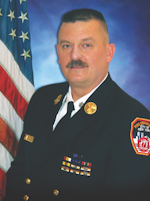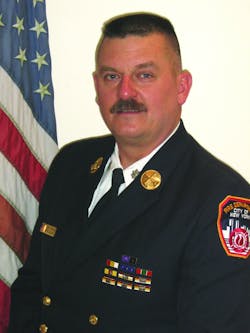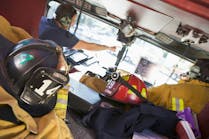Fire Scene: The Behavior of Superior Officers
While reading a leadership book by Gen. Colin Powell, I came upon a fantastic quote, “Never walk past a mistake.” What great advice for a leader in any field, but especially the fire service.
There are MANY situations in which an officer might observe or discover something being handled incorrectly. Looking over the company apparatus, an officer might notice a tool is missing or misplaced. During afternoon company drill, the officer could discover that the unit’s hydraulic spreader was not refueled the last time it was used. At an incident, the officer might see a firefighter using a tool in an unsafe manner. The list goes on and on and on. The real question here is not how often you see something wrong, but rather what you do about it. Let’s review the several reasons that you, in your role as a leader, should never walk past a mistake.
Attention to detail
When you discover a mistake, it shows that you are paying attention. You are looking at the rig, the tools, the firehouse workbench, etc., with attention to detail. Some bosses simply walk around and don’t really examine what they see. They are going through the motions, walking around in a fog. They are walking around to be seen, not evaluating what is happening around them.
Do you think the firefighters who are doing the morning apparatus and tool check notice that the officer didn’t see the tool that was missing or the hose packed incorrectly? They do and it doesn’t do much for the officer’s standing in their eyes. If you are going to make the effort to get down on the apparatus floor, make sure you take it all in and ensure that everything is as it should be. Remember, the fire service has standards. Every department and company should also have those same high standards. If jobs are not being performed properly or tools are not being maintained correctly, your standards are slipping. And if the officer doesn’t notice that a mistake has taken place, they are simply contributing to the degradation of the standards.
Moral courage to take action
The second reason you need to correct mistakes is that it displays to the firefighters that you have the moral courage to take action to make sure everything is being performed properly. Officers and firefighters work closely with each other in a firehouse atmosphere that can often create a “friendly” relationship. This relationship is fine if it does not prevent the officer from inserting themselves into a situation that needs to be corrected. I have worked with officers who were highly respected and well liked. You could work with them for weeks or even months without ever hearing a question or correction. Most of the firefighters who worked with them enjoyed working on their shift and felt that brotherhood connection with them. However, if a firefighter failed to properly check a tool or SCBA or made a tactical mistake on the fireground, something was said. There are many ways to handle these situations, some immediately as they occur and others privately back at the station. How and when are not the critical issues here, but rather the fact that the correction is made and the mistake is acknowledged and corrected.
Caring about the crew
The third reason for never walking past a mistake is that it shows the members of the crew and the company that the officer cares about the company and the firefighters. When a lieutenant lifts a 2½-gallon water extinguisher off the running board of a ladder truck and discovers that it is almost empty, there is a problem. The tool is clearly out of service and useless for the next alarm. If the officer had not made this discovery, a firefighter pulling it for a house fire might suddenly have to deal with the situation—at the worst possible moment. Further, this could negatively affect the safety of the crew at their next fire. We carry tools and extinguishers and wear PPE for our safety. Sure, it helps to get the job done but our safety is paramount.
Final thoughts
How ready we are, how we perform our duties and how we maintain our tools and apparatus all reflect upon the company pride and its ability. Companies that ride around with dirty apparatus and rusted tools and empty water cans can have only one kind of reputation.

John J. Salka Jr. | Battalion Chief
JOHN J. SALKA JR., who is a Firehouse contributing editor, retired as a battalion chief with FDNY, serving as commander of the 18th battalion in the Bronx. Salka has instructed at several FDNY training programs, including the department’s Probationary Firefighters School, Captains Management Program and Battalion Chiefs Command Course. He conducts training programs at national and local conferences and has been recognized for his firefighter survival course, “Get Out Alive.” Salka co-authored the FDNY Engine Company Operations manual and wrote the book "First In, Last Out–Leadership Lessons From the New York Fire Department." He also operates Fire Command Training, which is a New York-based fire service training and consulting firm.






